The Yang Slinger: LXVI
As journalists, we all make mistakes. But even with age and experience and success, they never become easier to digest. And they never leave us. Dammit.
Back in the lord’s year of 1995, when I was but a 22-year-old scribe at The (Nashville) Tennessean, I was assigned what had to be the coolest piece of my young career: To follow around a local up-and-coming rock band, then chronicle the highs and lows, nightmares and euphorias of their existence.
The group was named Dreaming In English1. It was comprised of five guys who were beyond giddy with the potential exposure such an article could offer. So, for a week, I hung with the talent: singer Tyrone Brooks, lead guitarist Roger Nichols, bassist John Massey, drummer Derek Wiseman and keyboardist Drew Wiseman. I attended rehearsals. I shared meals. I helped tape up posters and flyers and I listened as guitars were strummed and microphones adjusted. Finally, I attended their somewhat-packed-but-not-really-packed gig at a local bar, 12th and Porter. “Over the course of the two-hour show,” I wrote, “the power goes out … twice. Brooks forgets the lyrics to one of the songs. He also feels the need to puke one more time. Massey breaks some strings. Nichols hits a high note—a very, very high note. "‘Helloooooooo Cleveland!’ he tells to the crowd at one dead point. Despite the troubles, no one in Dreaming In English complains. The five agree it’s the group’s best showing ever, and Nichols even manages to sell two DIE T-shirts.”
I’d only been a professional journalist for roughly half a year, and this was the story I was born to report and write. I still remember typing up the words, feeling as if I’d nailed every note. When the Jan. 29, 1995 issue of The Tennessean came out that Sunday morning, I rushed to the office (I lived about a mile away) to snag an early copy.
It was the most beautiful thing I’d ever seen …
After reading every word, I excitedly called Nichols, the Dreaming In English ring-leader.
“Did you see the story?” I said.
“I did,” he replied. “It was great! Great story!”
…
…
…
“But Ty’s last name isn’t Brooks. It’s Banks.”
We all make mistakes.
That’s a line we, as Homo sapiens, utter to cover all circumstances big and small. It’s used to comfort us. To alleviate our pain. To abolish our guilt. Yes, you fucked up by failing to pay back Grandma … by crashing your Jeep into the nearby Carvel … by slicing the head off your sister’s Cabbage Patch Kid … by setting the house aflame and killing your beloved hamster, Archi Cianfrocco. But you are only human, and humans are imperfect and flawed.
So, hey. We all make mistakes.
The thing about journalism mistakes, however, is they take place in a painfully public space. Back in the day, the Sunday Tennessean was read by about 300,000 people. Hence, 300,000 people were now under the impression Dreaming In English had a singer named Ty Brooks—and 300,000 people would read the later-in-the-week Page 2 correction (had I not chickened out and never told my editors—a huge, pathetic no-no).
Journalism mistakes are terrifying.
Journalism mistakes are heartbreaking.
Journalism mistakes are humiliating.
But journalism mistakes also wind up amazing stories to tell. And while the Dreaming In English fuckup was one of my worst blunders, it was far from my only blunder. In no particular order—I reviewed a Sheryl Crow concert and had her singing “Viva Las Vegas,” not “Leaving Las Vegas.” I bungled the name of the winner of a Music City Marathon. I had Yankees GM Brian Cashman (erroneously) barking at a player to start using steroids. I had Pirates manager Jim Leyland watching BP with a nonexistent coach. I had the wrong date for the 1986 Mets winning the World Series. I had the Lakers winning a game in overtime that never went into overtime. I had Bo Jackson driving east when he was heading west. I had Walter Payton running for 150 yards, not 75.
In nearly 30 years as a journalist, I’ve committed an endless string of errors. And while I’ve never been proud of them, I’ve also stopped running from them. Because, in a way, they’re the greatest lessons available. Wanna learn to check spelling? Misspell a name. Wanna learn to review a song title? Mangle a song title. Wanna learn to get your quotes right? Misquote someone.
Mistakes make journalists better. More responsible. More dogged. As an intern at the Lexington Herald-Leader, Teddy Greenstein wrote about Clay Norris when his actual name was Norris Clay. That never happened again. When she was a writer for Time Magazine, Desa Philadelphia spelled George W. Bush’s nickname as “Dubuya”—not “Dubya.” Folks complained. Lesson learned.
“Mistakes suck,” says Dan Shaughnessy of the Boston Globe. “They also stick in your mind forever.”
For the sake of this substack, I’m going to break down mistakes into two categories.
Factual errors.
Errors in judgment.
Neither are particularly fun.
When it comes to factual errors, well—yeah. I’m not even sure what to say. Sitting here with gray hair and a mini-gut, I make far fewer than I did in my Tennessean days, when I was a mistake waiting to occur. Back then, I was young and cocky and always in a rush. I would write, file, write, file, write file. The next story was eternally on my mind, which meant I paid far too little attention to the current story.
It happens.
Erik Sherman is the author of eight books, including “Kings of Queens,” his ode to the 1986 New York Mets. The book is well-reported and affectionately written. It also includes Kevin Mitchell’s girlfriend working in a beauty shop that he owned. “Well, she owned the place,” Sherman recalled. “Mitch called me in a huff and said she wasn’t happy.” Yaron Weitzman, Fox Sports basketball scribe, misspelled not one, not two, not three—but four names in his first-ever assignment. Dave Sheinin, the Washington Post’s all-everything superstar, used to cover baseball. The Seattle Mariners were managed by Lou Piniella. “I spelled Piniella wrong for an entire baseball season until someone on the desk finally pointed it out to me deep into the postseason,” Sheinin said. Chad Finn, then of the Concord (N.H.) Monitor, was thrilled to cover the hometown Red Sox in the 2003 American League Divisional Series. The Sox were playing the A’s—and this was Finn’s first-ever baseball assignment. “Wrote a story I was fairly happy with, made deadline, filed it for the front page ... and recoiled in horror the next morning when I picked up a copy and saw that I'd never included the score,” he said. “It was 3-1, in case anyone in the Concord, N.H. region is still wondering.”
As a young up and comer, Molly Yanity was covering a high school football game in Seattle. At the end of the fourth quarter, a player physically attacked his coach. “After a bit, I did talk to the coach,” Yanity said. “He was OK, blah blah. Of course, I wrote about the the dust-up, identifying the player by his number and the roster.” The roster—as these things go—was inaccurate. “I named a good kid who was on the JV team,” Yanity said, “not the guy that threw a haymaker at his coach before being thrown off the team.” Similarly, David Dorsey was recapping a prep game, writing about Noel Devine’s amazing 80-yard touchdown run— “with multiple spin moves and broken tackles,” Dorsey recollected. “Turns out it was actually a screen pass play, but I was jotting down a stat from the previous play in my notebook when the play began. So I thought it was a run, not a pass.”
So, again, factual errors happen, and will continue to happen. Even to seasoned pros. And, truly, the best way to handle them is with honesty and integrity. Admit to the blunder, apologize to the injured, post a correction. As one who used to hide from his mistakes—don’t hide from mistakes. There’s no glory in cowardice. Own it. Accept it.
Then move on.
That being said, errors in judgement are an entirely different animal.
Not a cute, cuddly one.
On July 27, 1993, Boston Celtics star Reggie Lewis died of sudden cardiac arrest while practicing on a basketball court at Brandeis University.
The shooting guard/small forward was a mere 27, and his troubles with a heart ailment had been well chronicled throughout Massachusetts. There had long been debate whether Lewis was wise to even be playing—a slew of doctors suggested he retire, and a mere one (literally one) said he was OK to continue his Celtics career.
Shaughnessy, one of the Boston Globe’s star columnists, was away on vacation in North Carolina’s Outer Banks when word of Lewis’ death reached him. He immediately sat down at his computer and wrote—angrily.
Really angrily.
Reading it now, some three decades later, it’s a helluva piece. But it was also ill-timed. When someone dies, people want to grieve, gather themselves, find a way to love and weep and digest.
“I knew it was harsh,” Shaughnessy says. “I was too close to it and I didn’t step back. I returned to Boston five days later and as soon as we got into range I heard my name on the radio. It didn’t go over well. It shouldn’t have gone over well. You have to take the temperature before you write something like that. It was a pretty brutal error in judgment.”
Shaughnessy need not beat himself up over WE HAVE LOTS OF QUESTIONS, WE HAVE NO GOOD ANSWERS because—I repeat—he is not alone.
Far from it.
Back in 1988, Gary Myers was a Dallas-based Associated Press writer covering the upcoming NFL Draft. Gil Brandt, the Cowboys’ vice president of player personnel, insisted (anonymously) that—were he available—the team would use the 11th pick to grab UCLA halfback Gaston Green. It could not have made less sense: Dallas’ roster included two superstar ball carriers, Tony Dorsett and Herschel Walker. Why would the team add a third halfback? “I was so hungry for a scoop that I never told myself: ‘If Brandt was really going to take Green, there was no way he would tell me,’” Myers said. “Brandt was using me to deceive other teams. But he had never lied to me so I went with the story about Green.”
The Cowboys, of course, took Miami wide received Michael Irvin—and Myers felt like a fool. “It was my job to trust my instincts,” he said. “And I failed to do so.”
Myers need not beat himself up over GREEN TO THE COWBOYS because—I repeat—he is not alone.
Far from it.
Back in 2011, a devastating tornado ripped through the state of Alabama. Lars Anderson was a Sports Illustrated senior writer who lived in Birmingham, and he quickly got to work on a story involving Carson Tinker, the University of Alabama long snapper, and his girlfriend, Ashley Harrison.
As Lars told it, as the storm approached Tinker and Harrison huddled in the master bedroom closet with their two dogs.
This is the start of Lars’ piece, which appeared in the May 23, 2011 SI …
This is how it ended …
“In putting this story together on deadline, my thought was to create as much emotional tension as possible in the beginning (meaning, essentially, pose a question that needs to be resolved; in this case, it was whether or not Ashley survived) and then loop back and answer that question in the end,” Anderson said. “And this is what I did. I literally heard from readers all around the world about how much it impacted them when they learned that Ashley had died. It humanized the tragic human cost of the tornado. So this was a good thing, right? A literary victory.
“Well, no. I forgot to employ the one thing that is most critical to me: empathy.
“Ashley's mother—and I won't use her name here—was incredibly upset with me after she read the story. She felt that I had compared her death to those of the two dogs and, worse, I had made the deaths of the dog seem more important because I listed them first. But to me, I was simply employing a literary technique and trying to hit the reader with an impactful emotional gut punch. Did I do anything ‘wrong’? To this day, I don't think so, but here's the truth: I can't stop hearing the anguish in the voice of Ashley's mother. Six years after the story was published, my twin girls, Autumn and Farrah, were born. They weren't even a day old when I looked at them and thought of Ashley and her mom and the heartache of losing a child. Just two nights ago, as I kissed my girls goodnight, I again thought of Ashley and her mother and just the cruelness of the tragedy.
“Now, a dozen years after the story, I still ask myself: Did I do the right thing by essentially using Ashley as a literary device to make an impact on the reader? In my defense, I did include biographical information on Ashley, trying to paint a portrait of her as a talented, smart, beautiful young woman whose future was limitless. When I wrote a book based on the Sports Illustrated story, ‘The Storm and the Tide,’ I donated proceeds to Ashley's scholarship fund and encouraged readers to contribute.”
There is a reason super pros like Dan and Gary and Lars remember their lowest journalistic moments. There’s a reason, when I asked Mike Vaccaro of the New York Post for his most-memorable blunder, he went back to his time in Fayetteville, Ark., when he violated a coach’s trust in the name of a (fairly meaningless) scoop. There’s a reason, when I asked the legendary Rick Telander the same question, he said he remained “sorry to this day” for “using a devastating and harmful quote from a nice and decent sports information man about former basketball star Ernie Digregorio. This was many years ago. No matter. It was said to me as hyperbole, as an aside. It was juicy, tantalizing, true in its way, but unfair to use in a profile.”
There’s a reason our worst errors become self-inflicted tattoos, crudely carved into our arms and legs and—even when corrected with decades of solid reporting—still remain infected and sore.
I am 51-years old.
I’ve probably written 10,000 bylined stories.
I’ve produced 10 books.
I have a wife and two kids and a dog and a house and all my teeth.
Yet I remain the fool who referred to Ty Banks as Ty Brooks in print.
I can’t let that go.
And I never should.
The Quaz Five with … Chelsi Stone
Chelsi Stone is a Nocona, Texas resident and a mother of three children. Her oldest, Laci, died last year in an automobile accident involving the University of the Southwest golf teams. One can donate to the Love Like Laci Foundation here.
1. So Chelsi, we met last year, and I think you'll understand when I say I wish we'd never met, because the circumstance was an article I wrote about the passing of your daughter, Laci, in a van accident involving the University of the Southwest golf team. And I wanted to ask, how does one adjust to the loss of a child? Does one adjust? Are there ways to make the pain manageable? Does it at all get easier?: Nobody ever adjusts, but in my case I have two other kids who keep me busy. That helps a lot. I completely focus on how to be the best mom I can be for them under these circumstances. I have friends who have also lost children and I lean hard on them. It’s been a year and a half and I still feel a horrible emptiness in my heart that I just can’t fix and doubt I ever will be able to. Some days are a lot harder than others and every day I just have to do what I can do to get through that day.
2. What made Laci special?: Laci was a child of two teenagers. We had no clue what we were doing but she shined and was so mature and just kind. Laci lit up every room she was in with her beautiful smile and outgoing personality. She was so funny and loved to sing and dance. She never sat still to much and was always wanting to make us laugh. She had a sensitive side that not many people saw but she could cry pretty easily over just having a bad day or not getting that putt she wanted after driving the ball right on the green. She had lots of emotions which made her very special. She always had friends around her and since she played select teams for volleyball and softball she had best friends in so many towns around us. She was an adventurous soul and always wanted to travel. She had big plans!
3. You and your husband Haydan were, I felt, very open and welcoming to me, and I guess I sort of wonder—why? Like, in the midst of tragedy I found you guys to be very warm, open, compassionate. When you easily could have been justified in telling me to fuck off.: Haydan and I have said for a year and a half that we want to shout Laci’s name from the roof top and tell so many people about her. She loved attention and being in any spotlight, so hearing you were writing an article for Golf Digest, we knew she would be saying, “Oh yeah, you’re going to do that!” She would want her face in that magazine and we are here to make that happen for her. The warmth and compassionate is probably just good ol’ Southern hospitality that we come by naturally. But trust me, I’ve had enough times where I so badly want to tell someone to fuck off. You just happen to be someone who didn’t get that side of me—just yet anyways.
4. You have two other wonderful children. How are you changed as a parent, in the day-to-day parenting, post-accident?: My whole entire life for 20 years has been my kids. As they’ve gotten older they don’t need me as much, but I’m still there waiting to do anything I need. One of the biggest changes is I’m obviously more worried about anything happening to them. If they don’t answer my text or phone call right away my mind starts going to those horrible places. Right now our son is trying to pick a college and it’s hard to think about sending another child out into the world and hoping he comes home OK. I want more than anything to just put them in a bubble and protect them with everything I have, but they are both great kids and I know they will go out and do wonderful things.
5. What does it for you? What I mean is, what sparks joy in you? How do you find rays of happiness? Chocolate shakes? Your son running 50 yards for a touchdown? A quiet walk?: My kids for sure give me the joy I need to survive. Johnathan running for a touchdown or making a big sack in football, Kaygan getting a huge dig or getting an ace in volleyball! Seeing them succeed has helped a lot. Hearing Laci’s friends tell me stories or share videos of her always put a smile on my face. Getting to do things with my husband that we haven’t done before, like a little bit of traveling, gives me a lot of joy and has really helped us reconnect. Even just sitting in my living room and watching mindless reality TV gives me some joy and keeps my brain from thinking too hard about what is going on in my life that is just hard.
[Bonus—rank in order favorite to least]: Nocona cowboy boots, Dak Prescott, Doja Cat, that really gross German restaurant I had the misfortune of eating at, Peach Snapple, Nocona High football uniforms, Scottie Pippen: 1. Obviously Nocona High football uniforms—I’m a football mom through and through! Not the best golf mom. 2. Nocona cowboy boots—they were my first boots I ever had at 1-year old. My grandfather managed the factory and he alway made sure we had some Nocona boots. 3. Dak Prescott—I’ll always be a Cowboys fan, but honestly I’m a tried-and-true ‘90s Cowboy fan and love me some Troy Aikman. 4. Scottie Pippen—Of course, I also love basketball! 5. Doja Cat—good songs and Laci loved that music 6. The bad German restaurant—only because someone ate there the other day and said it had gotten better. Might try it again soon. 7. Peach Snapple—because I’ve never even drank Snapple, so that’s not fair to put it above anything else.
Ask Jeff Pearlman a fucking question(s)
Here’s a wacky idea—ask me any journalism question you like, and I’ll try and answer honestly and with the heart-of-a-champion power one can expect from a mediocre substack.
Hit me up in my Twitter DMs, or via e-mail at pearlmanj22@gmail.com or just use the comments section here …
From Unnamed: How does the arrest of Keefe D impact your Tupac research? And is it good for your book?: So when the news broke, my phone nearly blew up with people calling, texting, congratulating me on a development that would surely help my project draw new audiences and scale new heights.
But—just being honest—I sorta hate it. I like when books have a definitive beginning, middle and end. I also like when reporting has a definitive beginning, middle and end. But when you’re writing as news is breaking, it feels … uncomfortable. Makes me jumpy and nervous and twitchy.
So does it impact research? Sure—because it’s an area that requires my attention. Does it sell more books? Probably not.
A random old article worth revisiting …
On March 15, 1980, the Houston Oilers sent starting quarterback Dan Pastorini to the Oakland Raiders in exchange for Ken Stabler. The swap always fascinated me, so I thought this next-day UPI piece was interesting stuff …
This week’s college writer you should follow on Xitter …
Eddie Rosenthal, Western Michigan University
Rosenthal, the sports editor for the Western Herald, is covering the university’s hockey team with the doggedness and professionalism of a pro. His recent piece, HOCKEY SEASON PREVIEW: WMU TASKED WITH REPLACING TOP LINE, won’t blow you away with funky words and dazzling transitions, but it’s a well-reported, properly produced explanation of what to expect in the upcoming season.
Write Rosenthal:
One can follow Eddie on Twitter here.
Bravo, kid.
Journalism musings for the week …
Musing 1: The Washington Post announcing a new round of layoffs is nothing short of depressing. First, because it’s America’s best newspaper. Second, because that’s 240 journalists out of work. And third, because … if the Post can’t hack it, what publication can? For fuck’s sake, it’s the top source of news out there. “Our prior projections for traffic, subscriptions and advertising growth for the past two years — and into 2024 — have been overly optimistic,” Patty Stonesifer, the interim chief executive officer, wrote in the email to staffers. “The urgent need to invest in our top growth priorities brought us to the difficult conclusion that we need to adjust our cost structure now.” Glub.
Musing 2: It only took Ron DeSantis 794,954 days to rightly slam Donald Trump for something. One day, if anyone cares, I’ll write a book about the Florida governor’s presidential campaign. Working title: “Dumb-Ass Motherfucker: Ron DeSantis and the Worst Run Ever.”
Musing 3: In case you missed this, former 1984 Olympic gymnastics supernova Mary Lou Retton is fighting for her life with pneumonia. Back nearly 40 years ago, l’il Mary Lou was an American phenomenon—the smiling, gleeful face of an optimistic nation. She oozed patriotism and hope and pep. Now, at 55, she’s struggling to live.
Musing 4: Want to congratulate Russ Bengtson, my ol’ University of Delaware pal and former NYC roommate, on the release of his first book, “A History of Basketball in Fifteen Sneakers.” Russ is one of the best in the biz, as well as a kind, decent man.
Musing 5: One of my favorite hip-hop artists is Glasses Malone, the SoCal-based flow guru whose new album, “Cancel Deeez Nutz,” dropped a few days ago. I have probably listened to the lead single, “Tha Loc,” a solid 500 times. It’s that good.
Musing 6: Amen.
Musing 7: My former Tennessean colleague Tom Wood shows how to write the perfect season preview piece with BRUNETTE, TROTZ TAKE PREDS BACK TO FUTURE for the Ledger. Writes Wood: “A quarter of a century ago, Barry Trotz made his NHL coaching debut by leading the Nashville Predators onto the ice for their inaugural season. One of his young stars during that 1998-99 campaign was left winger Andrew Brunette. Following a 1-0 loss to the visiting Florida Panthers in the opener, the Preds returned to the home ice three nights later. Brunette – who would spend one year in Nashville – scored the team’s very first goal as Nashville defeated the Carolina Hurricanes 3-2 that historic mid-October evening on Lower Broadway. Fast-forward 25 years. After many stops along their divergent careers, Trotz and Brunette have reteamed with the Predators, trying to recreate the Music City magic of that inaugural season.”
Musing 8: The new Two Writers Slinging Yang stars Ric Bucher, FS1 basketball analyst and longtime writing superstar.
Quote of the week …
Original name—C.O.P. (Cup Of Pee)




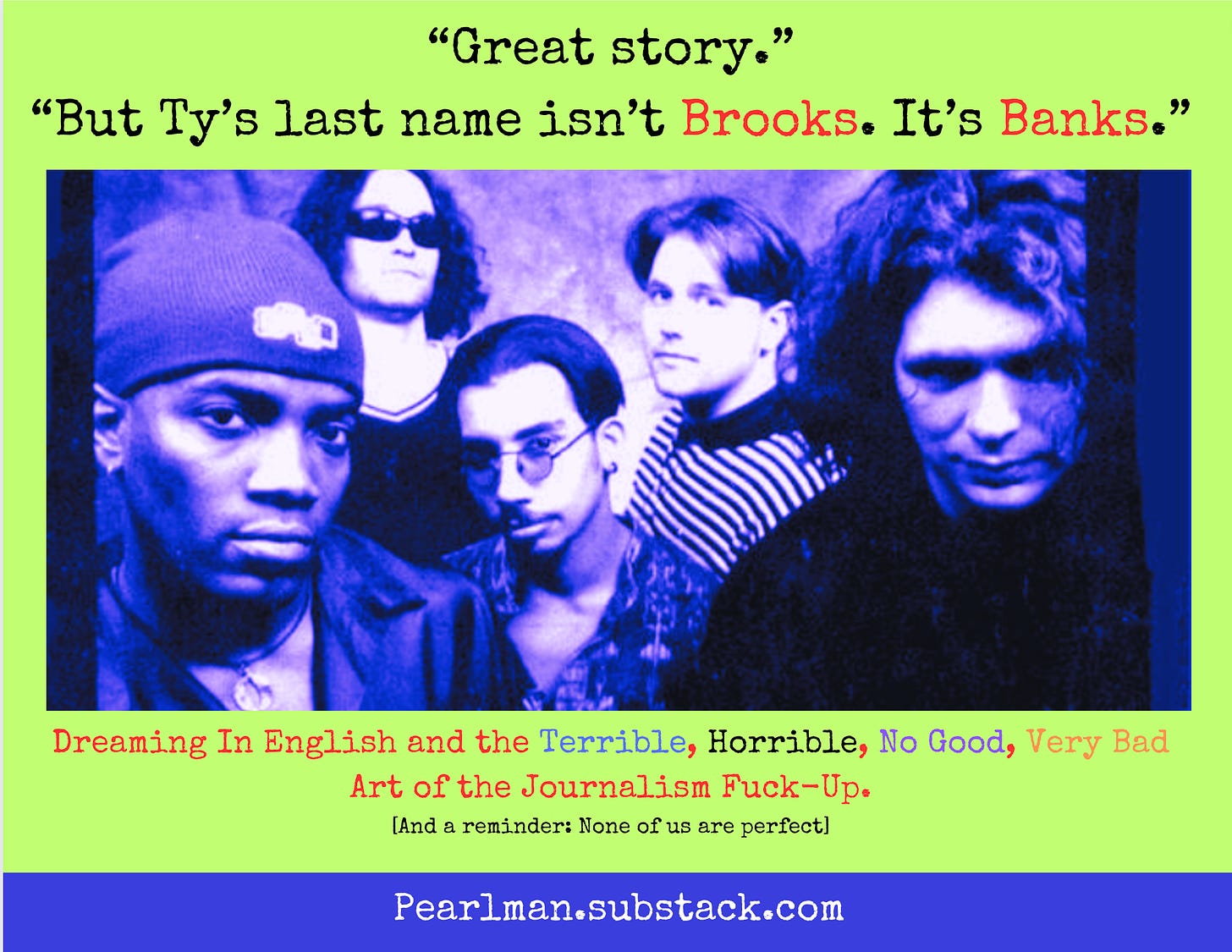
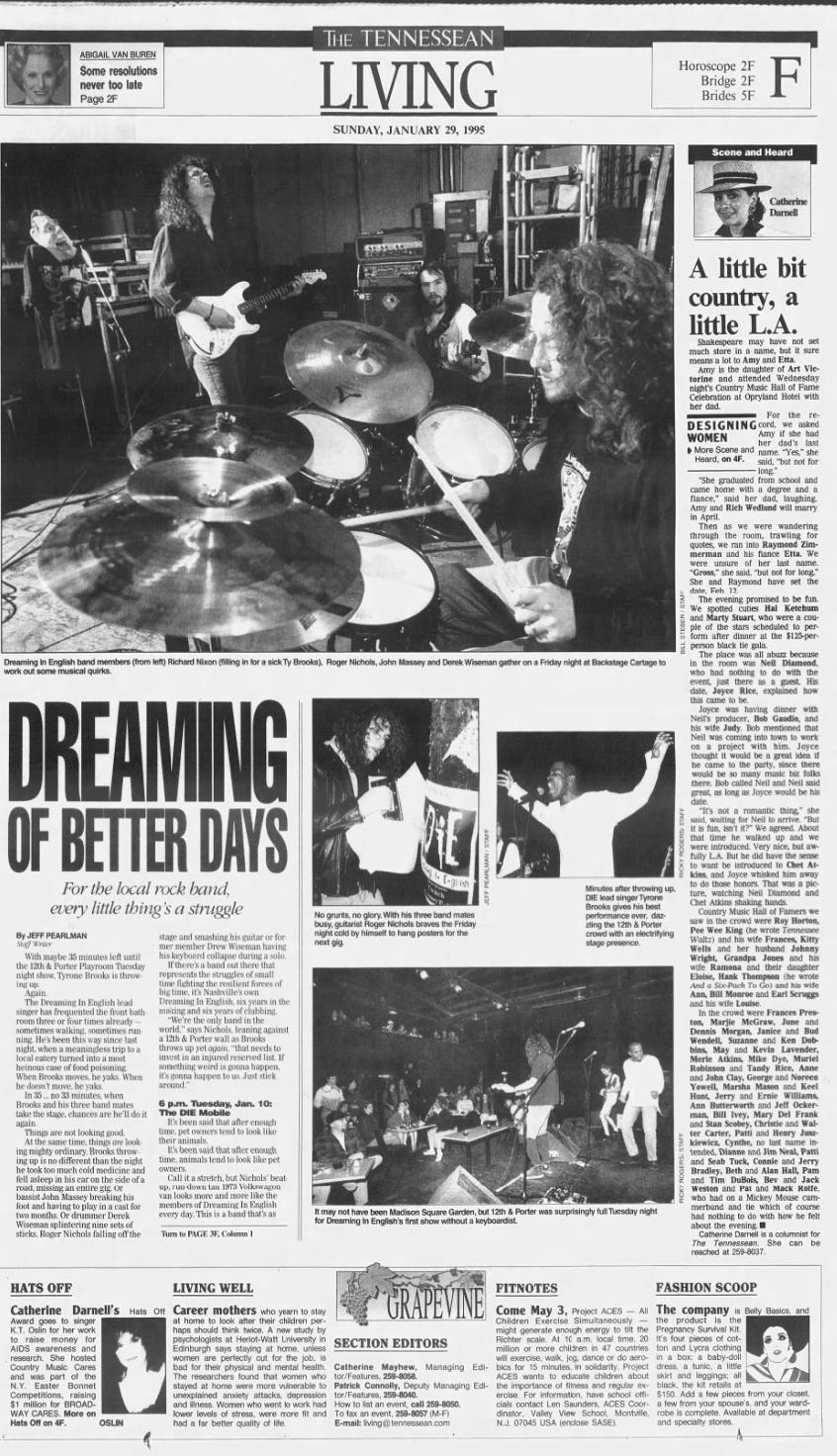
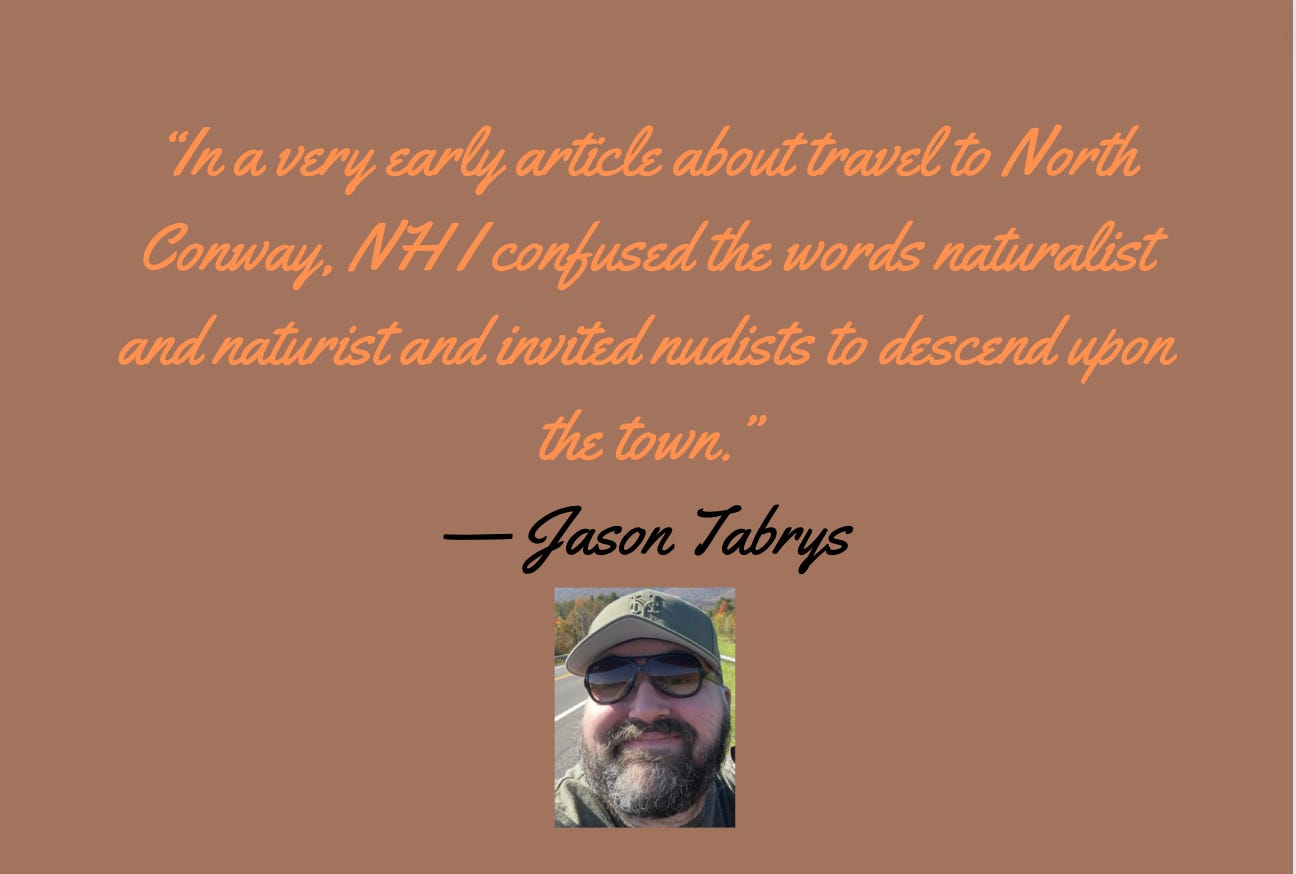
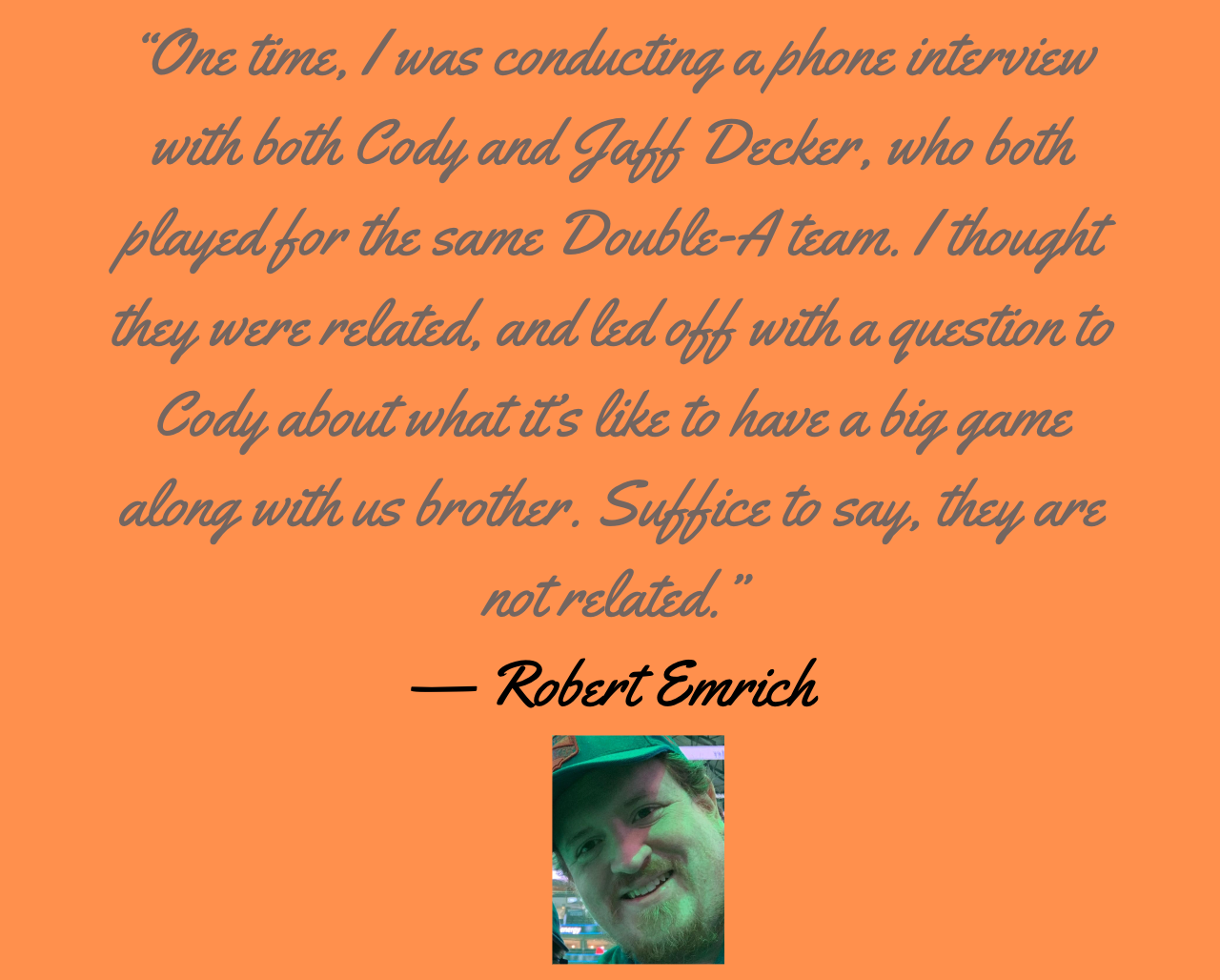
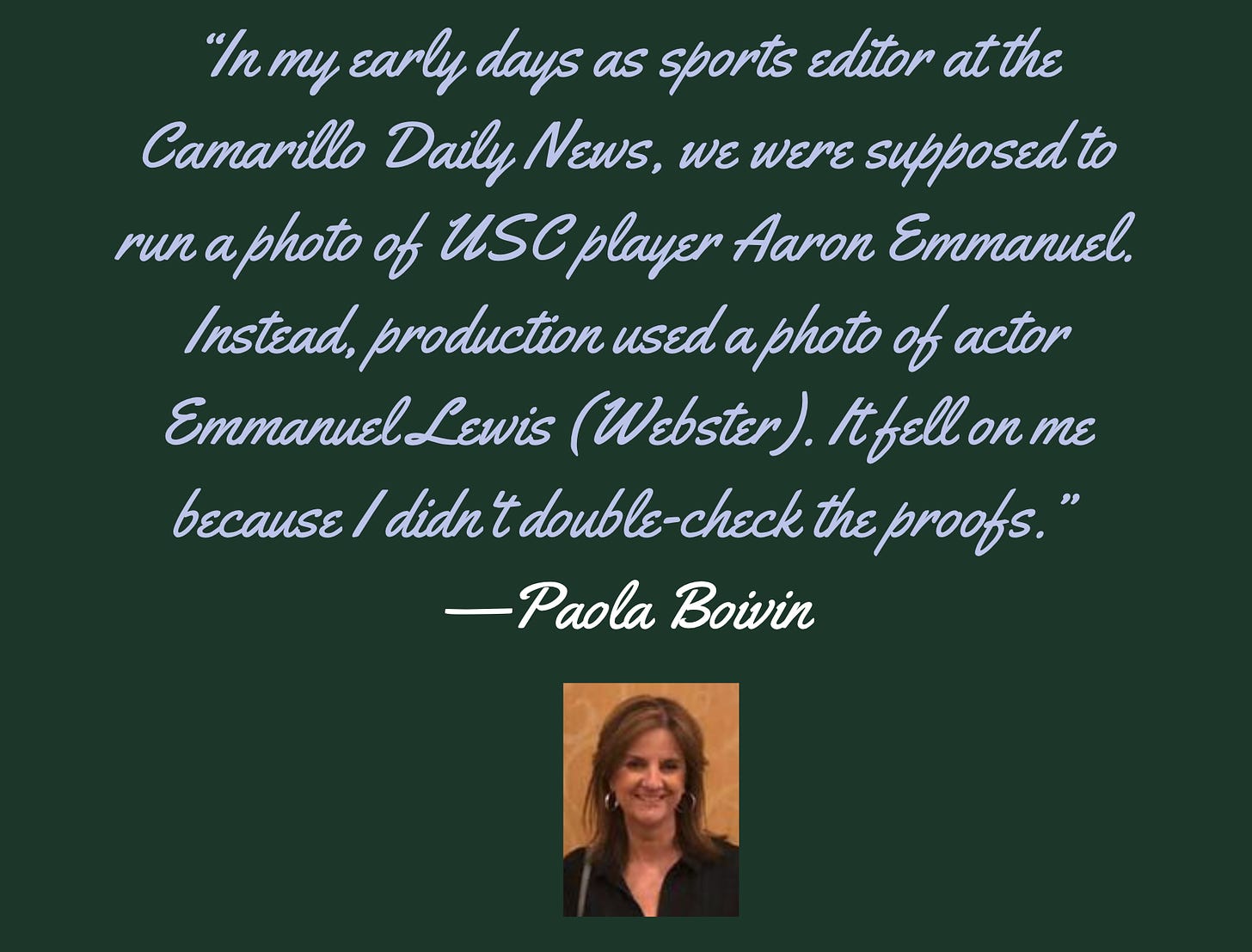
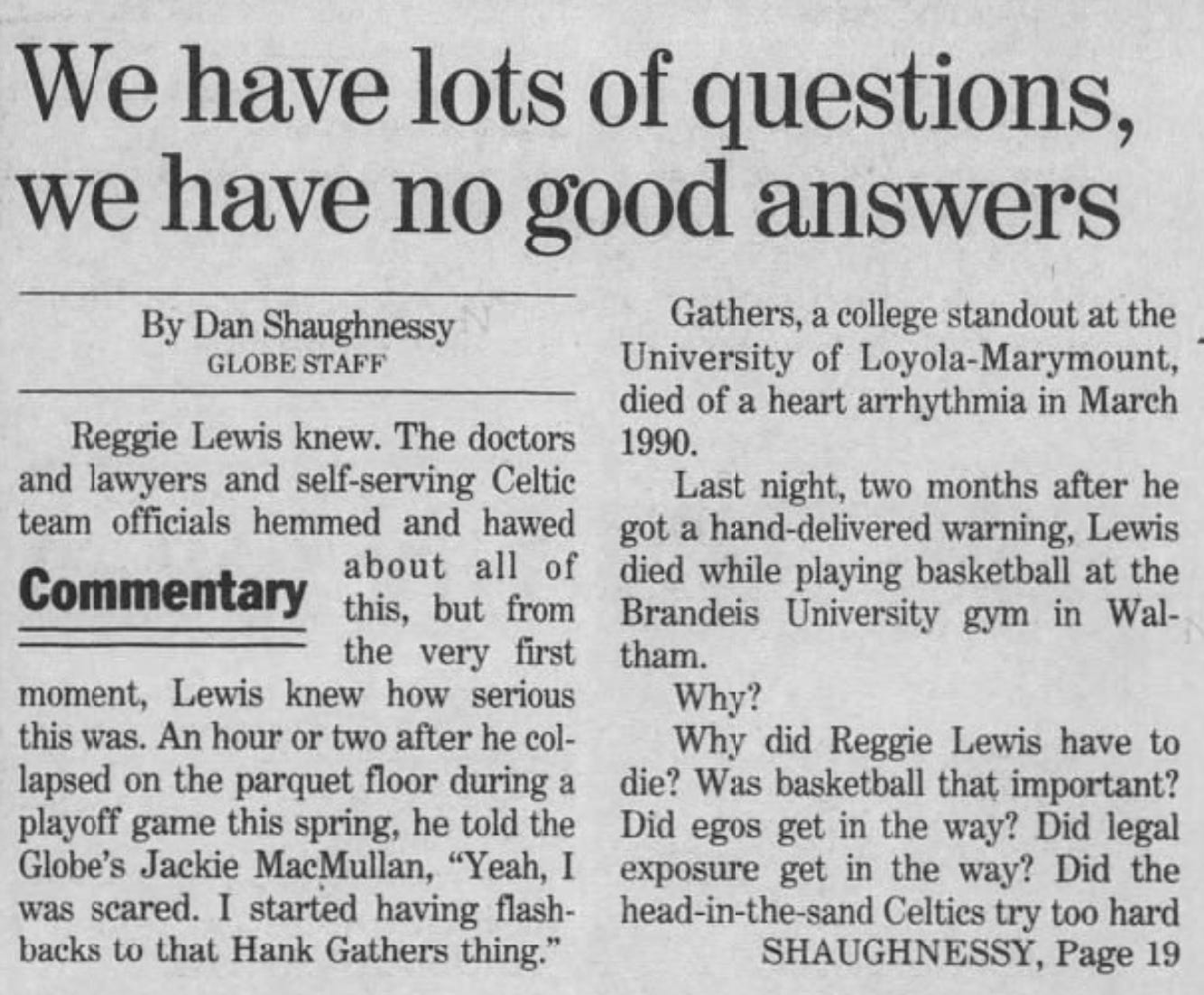
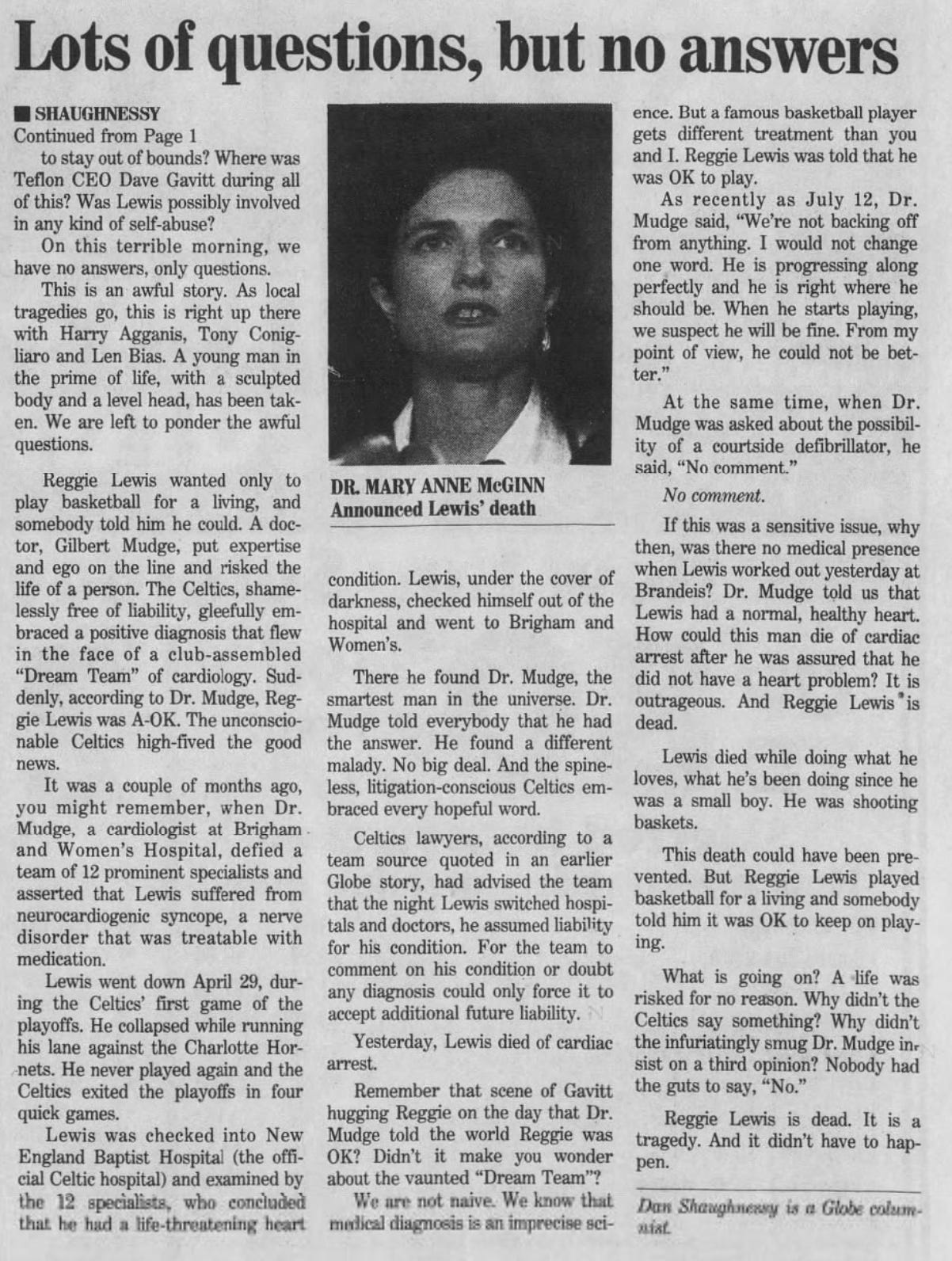
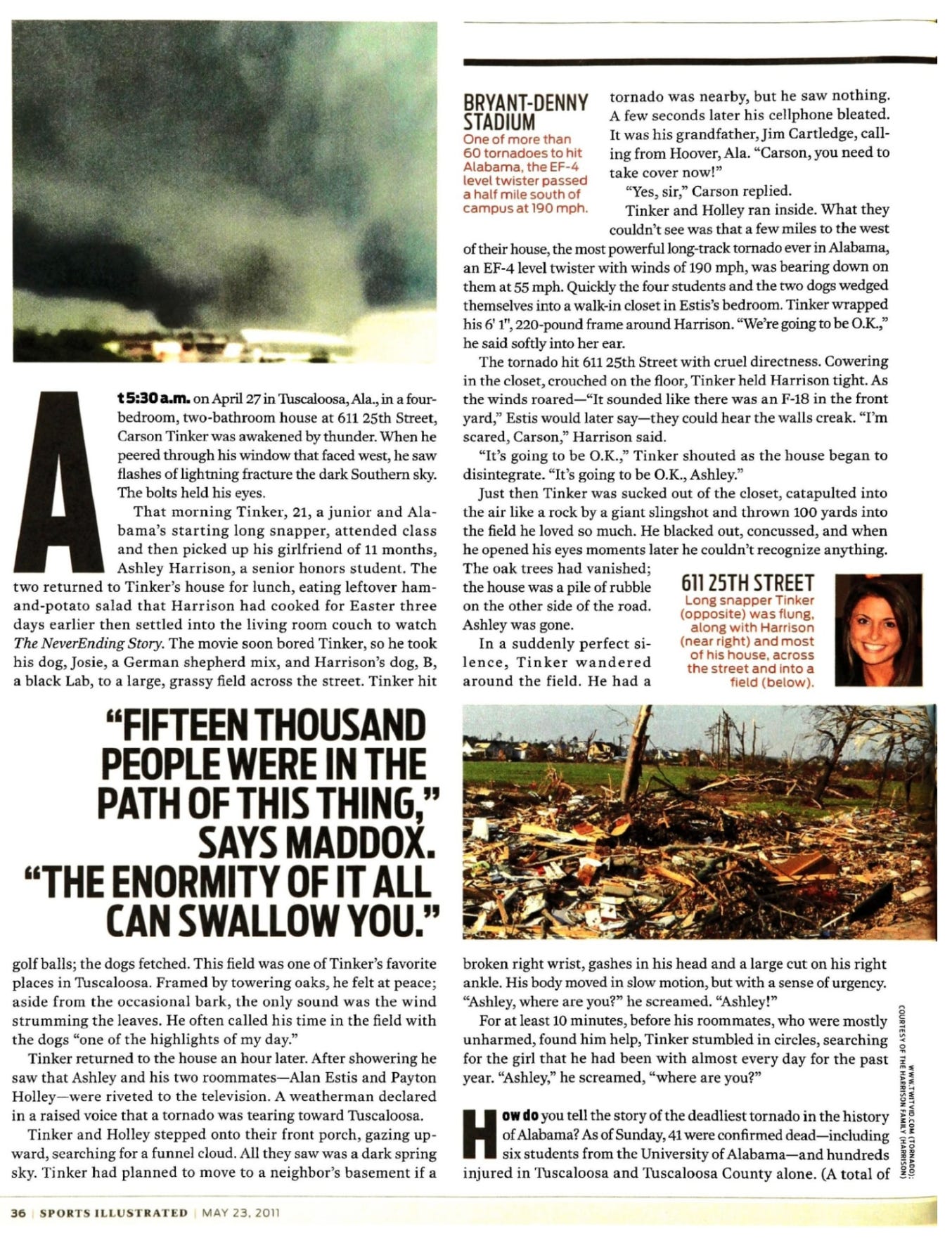
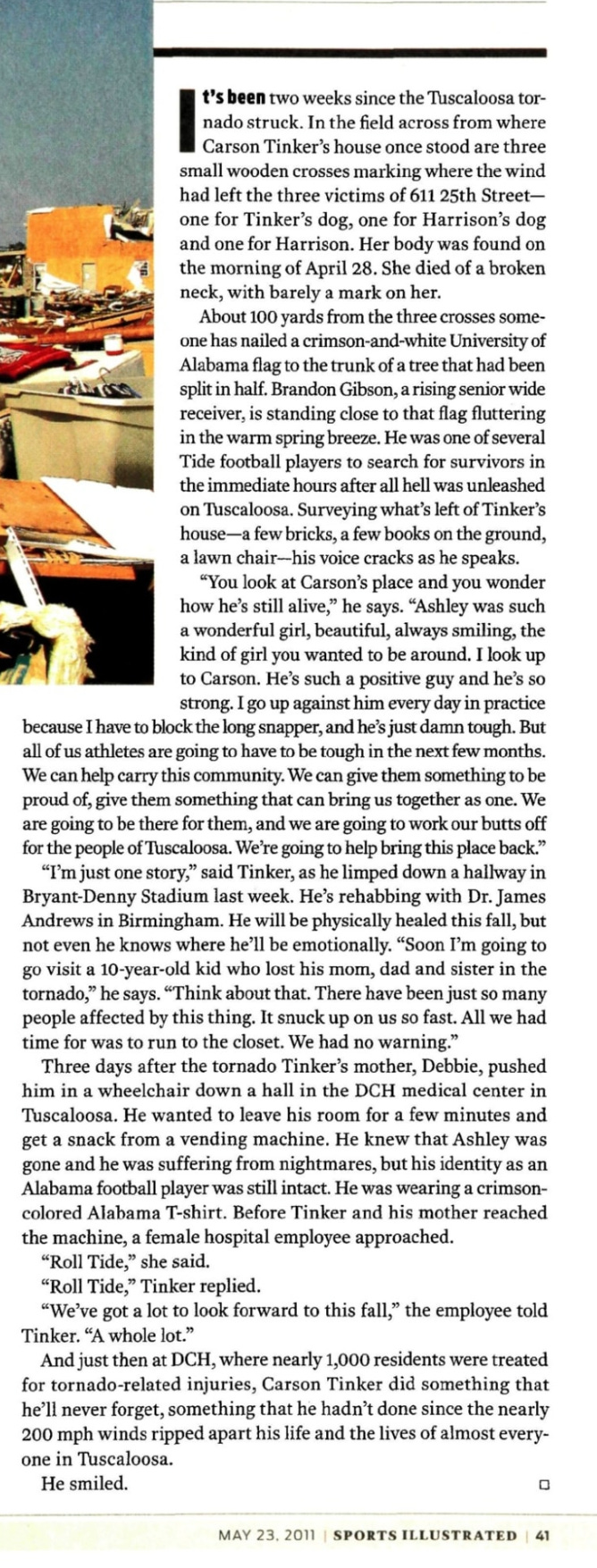
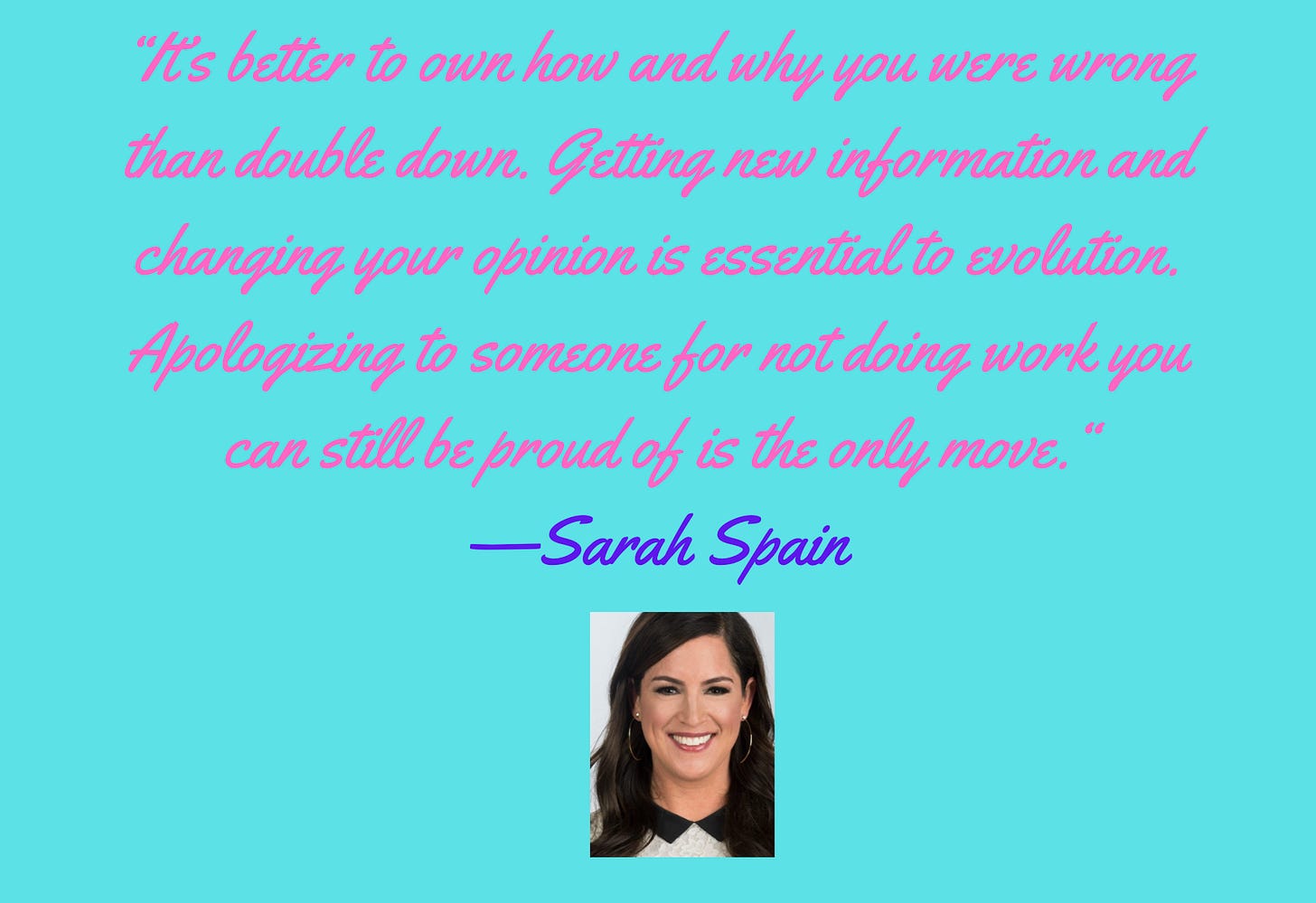
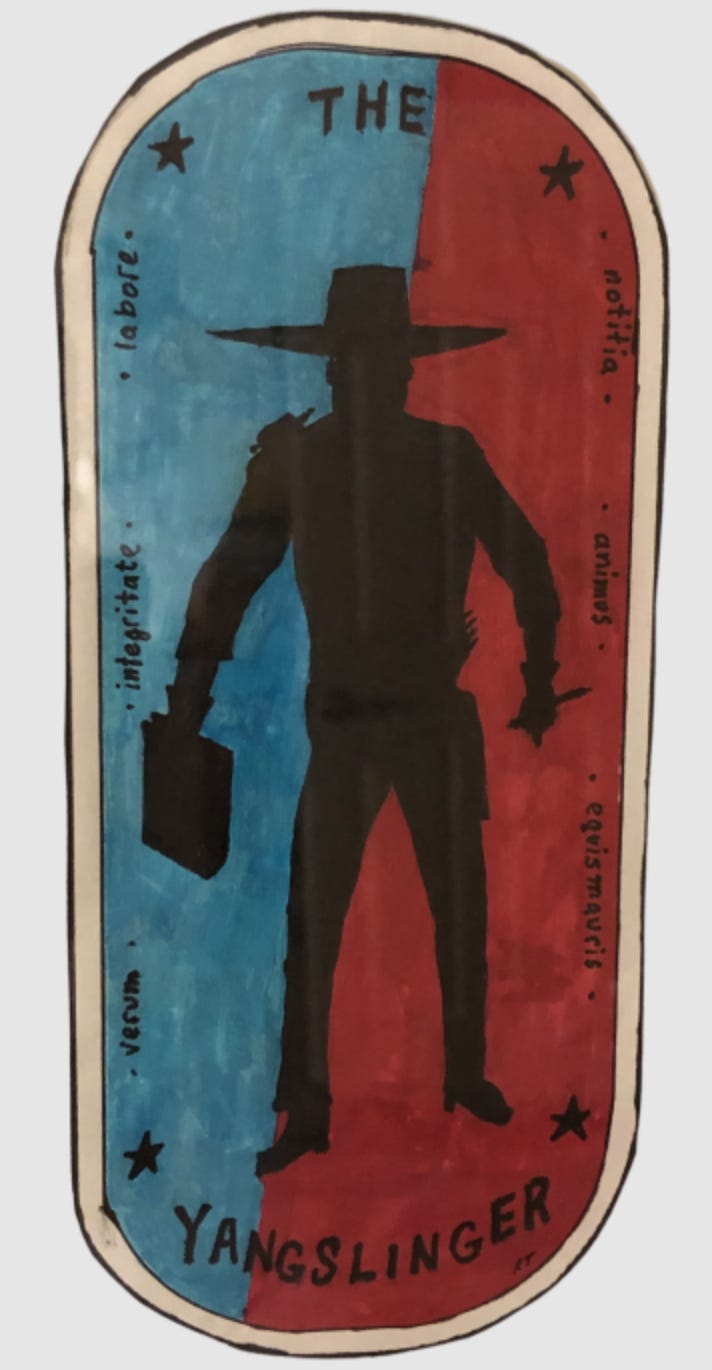
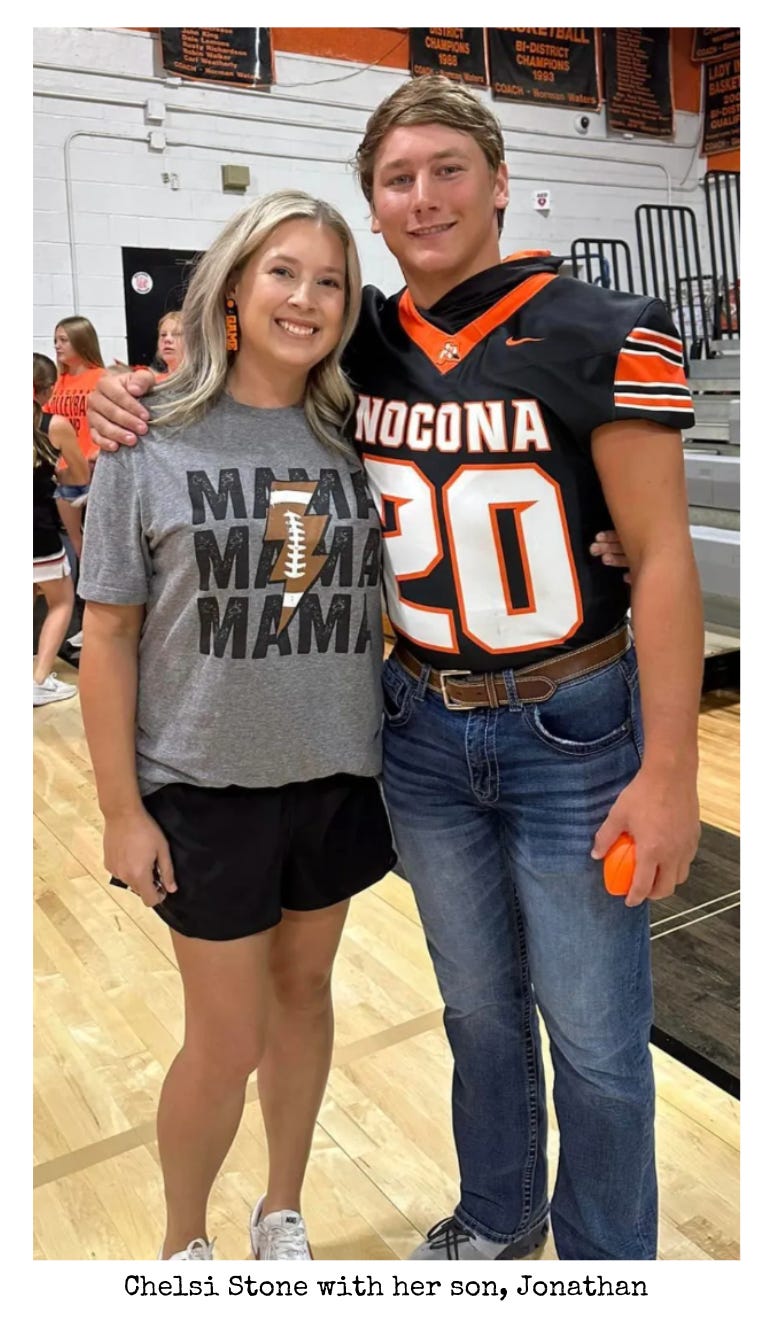

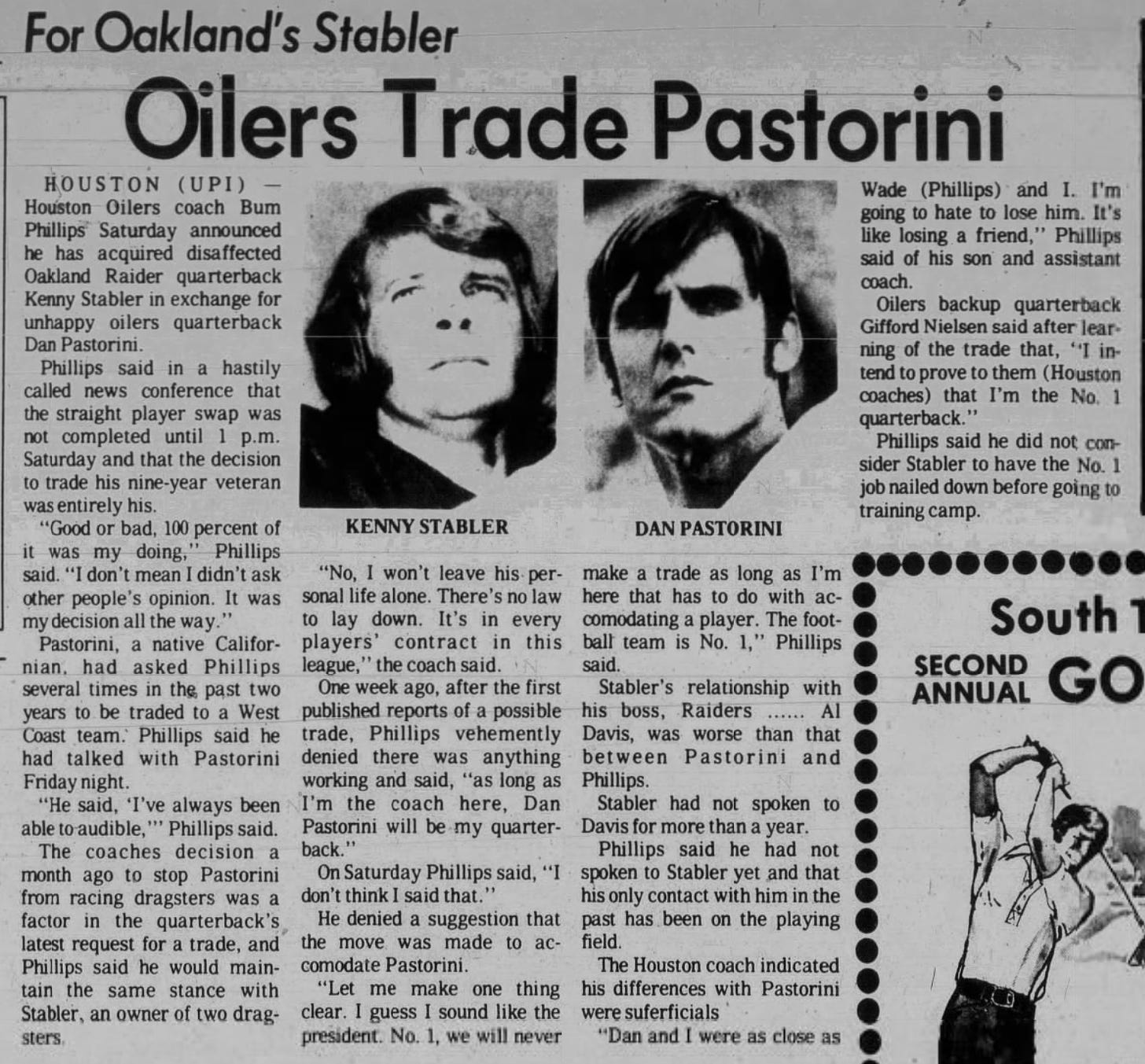

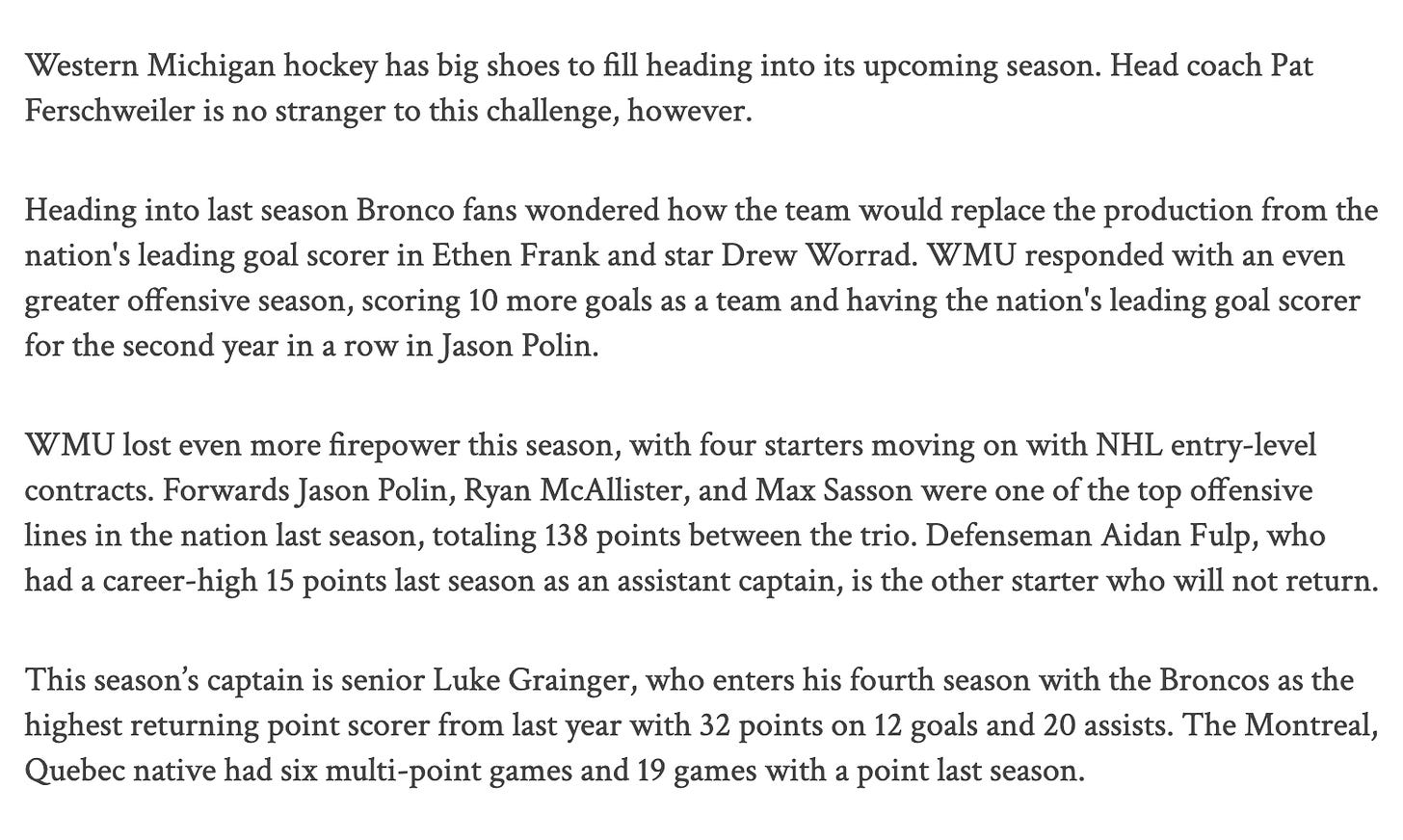
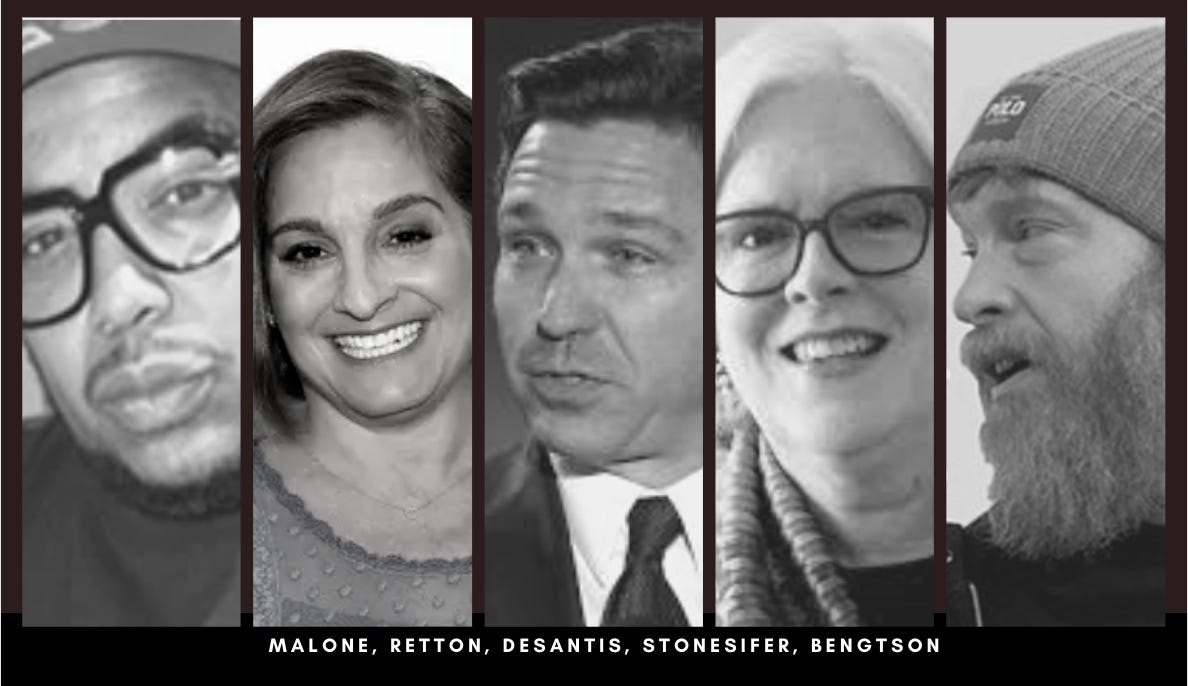
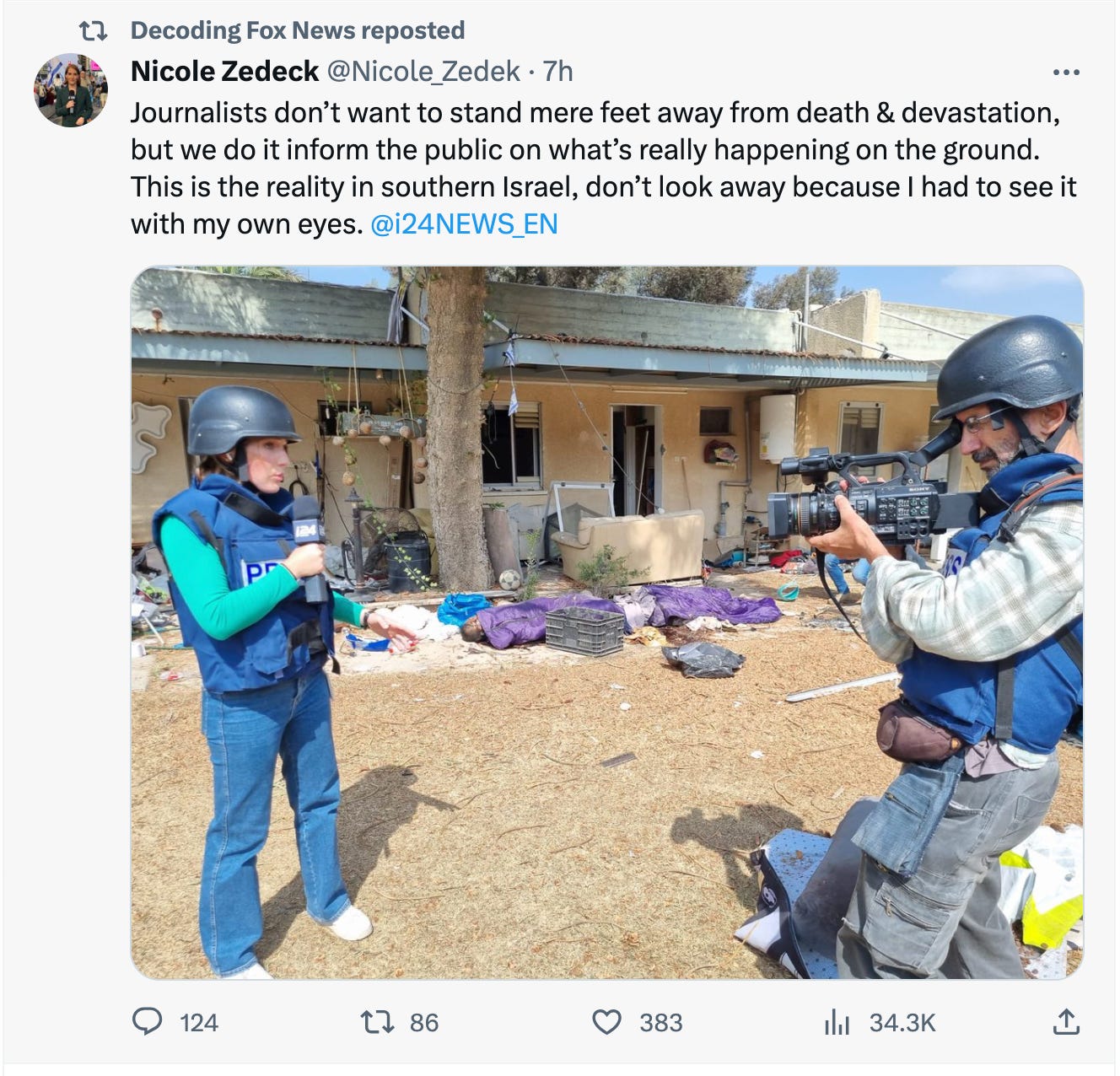
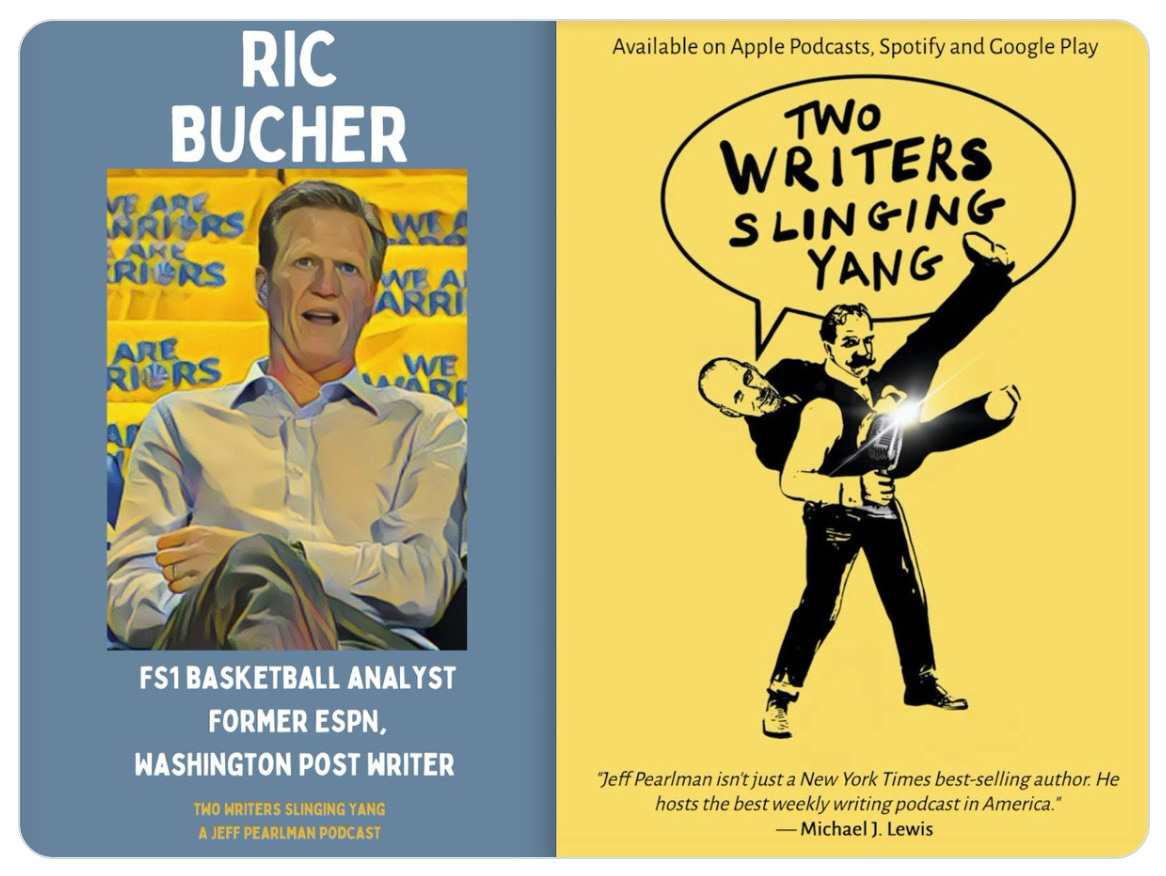

A few years ago I wrote a piece on the best uniforms in Chicago sports history. I quadruple-checked *every* fact and detail in that 1,000-word story. I turned it in, and sure enough my editor says, "... The Cubs' patch you mentioned is on the left sleeve, not the right."
Thankfully it was spotted and fixed in time. Obviously not the biggest mistake, but each error does chip away at your credibility (and a major error ruins it entirely). And this shows that no matter how thorough you are, mistakes do happen sometimes.
Thanks for that Bum Philips article. So great. I remember Dante as a Raider for a season but didn’t have any recollection of Kenny the Snake as an Oiler even though he was their starter for the next two years.